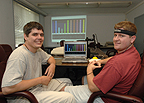August 06, 2007
Technology helps blind law student pursue dream

Caption follows story
As if law school isn't demanding enough already, imagine not having the ability to look through a stack of papers or see a computer screen. In a profession where long, complex documents are abundant and brail copies are scarce, Benney, a third-year law student, has found a way to navigate without seeing.
"I'm actually looking at yesterday's court docket that I put in here," the Wheaton native said, as he ran his fingers across the display on his portable Braille note-taker. "It's almost like scrolling down on a computer."
The device acts like a computer screen, but Benney runs his fingertips across the dots that raise and lower to form interchangeable Braille characters. When connected to a keyboard, it stores the typed material, and the user can read thousands of documents on the tiny machine.
With the help of technology such as his note-taker, Benney can do the same work in the same amount of time as his peers; he just does it differently. Benney also uses screen-reading software provided by SIUC's Disability Support Services, which enables him to control his computer with just his keyboard, while it verbalizes the content of the screen. He can surf the Web, read documents, and utilize most other programs on his computer.
This summer, Benney took his technology to the workplace as he interned at the Jackson County State's Attorney's Office in Murphysboro. His responsibilities included researching, writing, filling out forms, and observing in court.
"They even let me handle a few bench trials myself; I won one and lost one," Benney said. "I'm batting .500."
Michael Whitney, assistant program director of Disability Support Services, said technology brings unprecedented opportunity to students such as Benney.
"What law firm wants to hire you if you can't read legal documents and need a full time assistant?" Whitney asked. "This technology gives students equal access and helps employability."
With the help of technology, the job market is expanding for disabled students.
"Graduates previously worked as social workers or disability workers, but now they can be lawyers," said Jeremiah Womick, a graduate assistant in Disability Support Services. "A student can educate their potential employer about the technology and show that they can work and process documents as fast as anyone else can."
The technological advances of the past decade have continually brought more freedom and opened doors for people with disabilities. Disability Support Services works to employ those advances and make them easily accessible for SIUC students. For Benney's textbooks, the staff either orders audio versions or scans and converts them into Word documents, which he can then listen to with his screen-reading software.
The technology available to students at SIUC goes far beyond scanners and screen readers, though. For example, how does a paralyzed or severely disabled student do research on the Web without moving or speaking?
"Watch this," Womick said.
As he strapped on a black headband to begin his demonstration, several multicolored bars began to illuminate the screen. Suddenly, the mouse arrow began to move and click on icons, all while Womick sat in a chair, simply focusing on the screen with a slight grin. Is this sci-fi? No, it is simply what's available to SIUC students in need of a little assistance. By using sensors in the headband, the program monitors changes in brainwaves and facial muscles, which when coordinated by the user, can move a mouse and make several other commands.
"I can't wait to see what happens in the next few years," Whitney said of the technology.
Cyberlink, the hands-free "conscious control" program, is just one of the new resources Disability Support Services has to help students. Eye tracking programs, speech recognition and campus GPS are all helping further the education of disabled students at SIUC.
For David Benney, who doesn't like to sit back or be kept from achieving his goals, those services are critical. While specializing in criminal law, he looks forward to practicing as a defense attorney in the future. He also finds time for recreation outside of class and work. "I play for a blind baseball league," he said. "I play for the team based out of Indianapolis, and we have our national tournament next week."
Caption:
Controlling a computer with your mind? – Michael Whitney (left), assistant program director of Disability Support Services at Southern Illinois University Carbondale, and graduate assistant Jeremiah Womick demonstrate Cyberlink, a program that allows users to navigate and control a computer through brainwaves and brow movement. The program gives independence and opportunity to paralyzed and severely disabled students.
Photo by Russell Bailey
